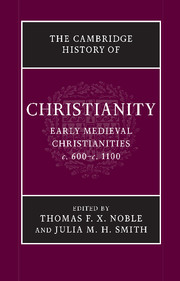Book contents
- Frontmatter
- Introduction: Christendom, c. 600
- Part I Foundations: Peoples, Places, and Traditions
- Part II Christianity in Confrontation
- Part III Christianity in the Social and Political Order
- 12 The Christian church as an institution
- 13 Asceticism and its institutions
- 14 Law and its applications
- 15 The problems of property
- 16 Ideas and applications of reform
- 17 Churches in the landscape
- Part IV Christianity as Lived Experience
- Part V Christianity: Books and Ideas
- Conclusion: Christendom, c. 1100
- Bibliographies
- Index
- References
13 - Asceticism and its institutions
from Part III - Christianity in the Social and Political Order
Published online by Cambridge University Press: 28 March 2010
- Frontmatter
- Introduction: Christendom, c. 600
- Part I Foundations: Peoples, Places, and Traditions
- Part II Christianity in Confrontation
- Part III Christianity in the Social and Political Order
- 12 The Christian church as an institution
- 13 Asceticism and its institutions
- 14 Law and its applications
- 15 The problems of property
- 16 Ideas and applications of reform
- 17 Churches in the landscape
- Part IV Christianity as Lived Experience
- Part V Christianity: Books and Ideas
- Conclusion: Christendom, c. 1100
- Bibliographies
- Index
- References
Summary
Between 600 and 1100, asceticism met with extraordinary success in the East and West. While some scholars attempt a global treatment of the history of late antique asceticism in both West and East, traditional historiography generally outlines separate histories for the early medieval period in the two zones. With this in mind, this chapter emphasizes points of comparison between the two, outlines shared traits and divergences, and seeks to explain them.
In their origins, the two traditions emerged from what was, in effect, a shared mould. The Roman world and its peripheries (the world of the fourth to sixth centuries in which various peoples, ideals, and texts circulated and interpenetrated) would furnish the shared bases for all later definitions of asceticism. For the authors of the seventh to the ninth centuries, in addition to the Scriptures (including numerous apocryphal writings), this corpus of literature generally included the acts of plenary and local councils, together with the writings of the church fathers, and hagiography and ascetic treatises ranging from the Life of Anthony to John Climacus’s Ladder of Divine Ascent. For these writers, there was a necessary equivalence between the terms “ascetic” and “monk”; we shall return to this equivalence in the first part of this chapter, which will examine the shared basis and the ensuing forms of monasticism.
- Type
- Chapter
- Information
- The Cambridge History of Christianity , pp. 275 - 298Publisher: Cambridge University PressPrint publication year: 2008

